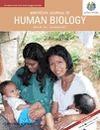
AMERICAN JOURNAL OF HUMAN BIOLOGY
metrics 2024
Uncovering the Intersections of Anatomy and Evolution
Introduction
American Journal of Human Biology (ISSN: 1042-0533, E-ISSN: 1520-6300) is a well-respected publication in the field of human biology, published by Wiley. Since its inception in 1989, the journal has provided a critical platform for advancing human biological research, featuring articles that encompass a wide range of interdisciplinary topics including anatomy, anthropology, ecology, evolution, and genetics. It has consistently achieved high impact, reflected in its prestigious quartile rankings such as Q1 in anthropology and Q2 in anatomy for 2023. With its robust Scopus rankings, notably ranking #10 in medicine - anatomy, the journal serves not only researchers but also professionals and students aiming to keep abreast of the latest developments in human biology. While the journal currently does not offer open access, it remains a vital resource for those committed to understanding human biological realities and challenges in an evolving global landscape. Its insightful contributions are indispensable in promoting scholarly dialogue and advancing knowledge across multiple relevant fields.
Metrics 2024
 0.65
0.65 1.60
1.60 2.20
2.20 93
93Metrics History
Rank 2024
Scopus
IF (Web Of Science)
JCI (Web Of Science)
Quartile History
Similar Journals

HUMAN GENETICS
Unveiling the complexities of human genetics.HUMAN GENETICS, published by SPRINGER, stands as a cornerstone journal in the field of genetics, offering a wealth of research insights since its inception in 1964. Hailing from Germany, this esteemed journal boasts an impressive Q1 ranking in both Genetics and Clinical Genetics, marking it among the top quartile of journals in these categories for 2023. With a notable Scopus rank of #7 in Clinical Genetics and a percentile ranking of 93, HUMAN GENETICS attracts significant attention from researchers and professionals dedicated to advancing our understanding of genetic influences on human health and disease. Although it does not currently offer Open Access options, the journal provides a critical platform for scholarly communication, aimed at disseminating groundbreaking findings in genetics and biotechnology. As the field evolves, HUMAN GENETICS continues to play an instrumental role in bridging the gap between laboratory research and clinical application, making it an essential resource for students and seasoned researchers alike.
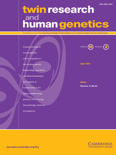
Twin Research and Human Genetics
Transforming Twin Studies into Groundbreaking Genetic InsightsTwin Research and Human Genetics, published by Cambridge University Press, is a leading academic journal that focuses on the vital intersections of genetics, human development, and twin studies. With an ISSN of 1832-4274 and E-ISSN 1839-2628, this journal serves as a critical resource for researchers, healthcare professionals, and students interested in advancing their understanding of genetic influences on human health and behavior. In its dedication to disseminating high-quality research, Twin Research and Human Genetics holds impressive category quartile rankings, including Q2 in Pediatrics, Perinatology, and Child Health, and Q3 in both Genetics (Clinical) and Obstetrics and Gynecology as of 2023. The journal has a converged publication timeline from 2005 to 2024, providing a longstanding platform for rigorous scientific inquiry and discussion in its specialized fields. As an open-access title, it fosters accessibility to vital findings and promotes collaboration among scholars worldwide, ensuring that groundbreaking research reaches a broader audience. Positioned within a challenging and competitive landscape, this journal stands out for its commitment to excellence and its pivotal role in shaping the future of genetic research and its implications for health across the lifespan.

HOMO-JOURNAL OF COMPARATIVE HUMAN BIOLOGY
Pioneering Studies in Comparative Human SciencesHOMO - Journal of Comparative Human Biology is a prestigious academic journal dedicated to advancing the field of comparative human biology, offering a platform for researchers, professionals, and students to disseminate cutting-edge findings. Published by E Schweizerbart'sche Verlagsbuchhandlung in Germany, this journal has been a crucial resource since its inception in 1950, featuring a rich archive of studies until 2023. It holds a Q3 quartile ranking in Anthropology and a Q4 quartile ranking in Miscellaneous Medicine, reflecting its significance and influence within the academic community. Although not an Open Access journal, it provides a wealth of robust research that intersects with various disciplines within the anthropological sciences. Researchers looking for a wide array of comparative studies and insights into human biology will find HOMO an invaluable addition to their scholarly resources.

Antropologia Portuguesa
Championing Open Access for Global UnderstandingAntropologia Portuguesa, published by COIMBRA UNIV PRESS, is a distinguished open access journal in the field of anthropology, with an ISSN of 0870-0990 and an E-ISSN of 2182-7982. Based out of Coimbra, Portugal, this journal has been a vital resource for researchers and enthusiasts in the anthropological community since transitioning to an open access model in 2012, allowing for broader dissemination and accessibility of knowledge. With its diversified publications spanning from 2011 to 2023, it is well-established within the academic landscape, achieving a Q3 category rank in anthropology as of 2023, and holding a Scopus ranking of #376 out of 502 in the Social Sciences category, placing it within the 25th percentile. The journal aims to foster interdisciplinary dialogue and promote innovative research, offering a platform for the exploration of various anthropological themes and practices. As it continues to contribute to the scholarship in anthropology, Antropologia Portuguesa is an invaluable resource for researchers, professionals, and students committed to understanding cultural dynamics and human behavior on a global scale.
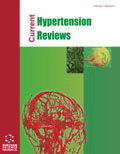
Current Hypertension Reviews
Exploring the Frontiers of Cardiovascular HealthCurrent Hypertension Reviews, published by Bentham Science Publishers Ltd, stands as a leading journal in the field of internal medicine, particularly focusing on hypertension and related cardiovascular disorders. With an impressive impact factor and ranked #59 out of 167 in the Scopus medicine category, this journal highlights key insights and contemporary research trends from its inception in 2006 to 2024. Its commitment to making high-quality research accessible to the medical community, despite lacking an Open Access option, ensures that it continues to contribute significantly to the scientific discourse surrounding hypertension management and innovative treatments. Researchers, clinicians, and students alike will find valuable resources within its pages, as Current Hypertension Reviews plays a critical role in advancing the understanding and treatment of hypertension, ultimately supporting better health outcomes globally.

Genes and Nutrition
Empowering Research in Genetics and NutritionGenes and Nutrition is a prominent open access journal published by BMC in the United Kingdom, dedicated to advancing knowledge at the intersection of nutrition, genetics, and human health. With the aim of making cutting-edge research available to a global audience, the journal has been a vital platform for sharing discoveries since its inception in 2007, and it continues to thrive with a convergence period extending to 2024. Recognized for its high-quality contributions, Genes and Nutrition is rated in the Q2 category within both Endocrinology, Diabetes, and Metabolism and Genetics as of 2023, reflecting its esteemed position in these fields (Scopus Ranks leaderboard places it at #72/244 and #109/347, respectively). This journal is an invaluable resource for researchers, professionals, and students alike, fostering collaboration and innovation in the understanding of how genetic factors influence nutrition and health outcomes. Accessible to all since 2016, it encourages dialogue and discovery, positioning itself as a leader in genetic and nutritional science.

Advances in Human Biology
Unlocking Insights into Human Biological ProcessesAdvances in Human Biology is a premier open-access journal published by Wolters Kluwer Medknow Publications, dedicated to disseminating innovative research and insights in the rapidly evolving field of human biology. With an ISSN of 2321-8568 and an E-ISSN of 2348-4691, this journal aims to provide a platform for researchers, professionals, and students to explore human biological processes, their implications for health and disease, and the latest advancements in biological technologies. Since adopting an open-access model in 2016, Advances in Human Biology has committed itself to increasing the accessibility of crucial scientific knowledge, enabling a wider reach and impact within the global academic community. Located in Mumbai, India, the journal is managed by Wolters Kluwer India Pvt Ltd, a respected name in scholarly publishing, ensuring high-quality content and rigorous peer review. Researchers contributing to this journal engage in a diverse range of topics, fostering interdisciplinary collaboration that is essential for addressing contemporary challenges in human biology.
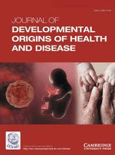
Journal of Developmental Origins of Health and Disease
Connecting Early Life Events to Health OutcomesThe Journal of Developmental Origins of Health and Disease is a premier academic publication under the esteemed Cambridge University Press, dedicated to advancing the understanding of how developmental processes influence health outcomes across the lifespan. With an ISSN of 2040-1744 and an E-ISSN of 2040-1752, this journal has established itself as a critical resource in the field of medicine, currently positioned in the Q2 category of Medicine (miscellaneous). Having converged from 2010 to 2024, this journal reflects a significant commitment to exploring the interconnections between early development and subsequent health conditions. Ranked 147 out of 398 in its category according to Scopus, it retains a commendable 63rd percentile status, highlighting its contributions to this rapidly evolving field. Though it does not offer open access, the journal remains a vital platform for researchers, professionals, and students interested in uncovering the intricate links between developmental biology and public health challenges.
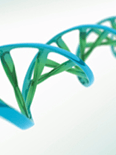
Annual Review of Genetics
Exploring the Depths of Genetic Discovery.The Annual Review of Genetics is a premier academic journal dedicated to advancing the field of genetics through critical, comprehensive reviews that synthesize current research and highlight future directions. Published by Annual Reviews, this esteemed journal boasts an impressive impact factor, ranking in the Q1 category for Genetics, and holds a distinguished position as 14th out of 347 journals in the Scopus ranking for Genetics, placing it in the 96th percentile among its peers. With its convergence of knowledge from 1970 to 2023, the journal serves as an essential resource for researchers, professionals, and students alike, facilitating a deeper understanding of genetic principles and their applications. Although the journal is not open access, it remains a vital platform for disseminating high-quality, peer-reviewed content that shapes the conversation in genetics, making it a must-read for those seeking to stay at the forefront of this dynamic field.

Phenomics
Bridging Biology, Agriculture, and Environmental Science.Phenomics, published by SpringerNature, is an innovative journal focused on the rapidly evolving field of phenomics, which examines the phenotypic traits of organisms and their implications for biology, agriculture, and environmental science. With the ISSN 2730-583X and an E-ISSN of 2730-5848, this journal provides a vital platform for researchers to disseminate high-quality, peer-reviewed articles that address key issues in phenotypic analyses and their applications. Although the journal is currently not an Open Access publication, it remains a crucial resource for professionals and scholars seeking to explore the intersection of genotype, phenotype, and environmental factors. Situated at the forefront of scientific inquiry, Phenomics aims to foster collaboration and advance knowledge in the field, making it an essential read for anyone engaged in biological and agricultural research.